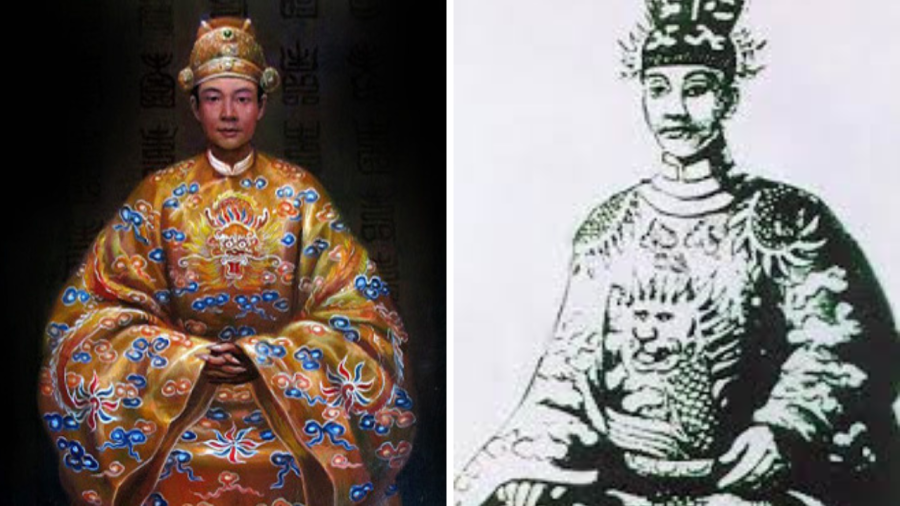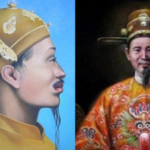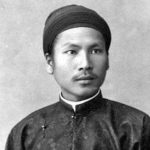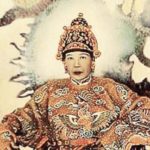Throughout Vietnam’s long history, there have been many talented kings who ruled on the throne for a long time, but on the contrary, there have also been many kings who had a very short reign and ended tragically.

Le Trung Tong, short-lived on the throne
Although he is listed in the list of Vietnamese kings, there is nothing remarkable about the career of King Le Trung Tong with the people and the country. According to the Dai Viet Su Ky Toan Thu, it is stated that the king’s real name is Huy Long Viet, the third son of King Le Dai Hanh (Le Hoan), and his mother is Queen Chi Hau Dieu Nu. One point praised about the king is his good personality, but it is also a weakness of someone in a high position: “Kind-hearted but does not know how to be a king.”
Historian Ngo Si Lien explains that Huy Long Viet was actually the person that King Le Dai Hanh left the throne for. That means the king took the throne as the rightful and legitimate successor. However, because in the past, King Le Dai Hanh had many sons, but the matter of determining the Crown Prince was not harmonious, so before his death, he changed the name of the successor. Perhaps because of this, his children were not satisfied.
This fact is still recorded in the essential parts of Vietnamese history. According to that, the eldest son of King Dai Hanh, Long Chau, died early. The second son, Long Tich, deserved to be established, but the fifth son, Long Dinh (Le Ngoa Trieu in the future), requested to be the Crown Prince, as the king intended. However, because the officials in the court deemed that action contrary to the rules, they had to stop it. In the spring of the year Giap Thin (1004), King Le Dai Hanh appointed Long Viet, the King of Nam Phong, as the Crown Prince.
It was not until October of that year that Long Viet finally ascended to the throne. But as the king of the early Le Dynasty, Le Trung Tong did not have time to do anything worthy of his position as ruler of heaven to replace, and he was assassinated by his younger brother Long Dinh.
How did Le Trung Tong get killed by Le Long Dinh? According to the Toan Thu, we know: “After that, Long Dinh ordered the thieves to climb the wall into the palace at night and kill Trung Tong.” Later, during the French colonial period, when writing the history of our country in the book “Abrégé de l’Histoire d’Annam,” Alfred Schreiner wrote as follows: “again, on the third day after ascending to the throne, he was killed by those kings. In the tale, he is called Le Trung Tong.” The actual events were indeed as described in the Toan Thu, and here, Le Long Dinh is the half-brother of Le Trung Tong. That’s when we see the power that makes siblings forget all about loyalty and decency. Writing about this, the Dai Nam Quoc Su uses a couple of verses to talk about the assassination of the king as follows:
Brothers fight against each other,
Causing the family reputation to be destroyed by whom?
Duc Duc, a pitiful king
Duc Duc was the fifth king of the Nguyen dynasty, the last feudal regime in our country’s history.
Since its establishment by King Gia Long in 1802, after a period of stable development under the reigns of King Gia Long, Minh Mang, Thieu Tri, and the early period of King Tu Duc, the Nguyen dynasty began to decline when the French army invaded in 1858.
King Tu Duc was weak and sickly since childhood. He had around 300 wives and concubines but had no children. With no heir, the king had to choose to raise three princes from within the imperial family, one of whom was Duke Duc later.
According to the book “Chin Doi Chua, Muoi Ba Doi Vua Trieu Nguyen,” King Duc Duc (1852-1883) was originally named Nguyen Phuc Ung Ai, which was changed to Nguyen Phuc Ung Chan by Tu Duc later.

Duc Duc Tomb
He was the second son of Thoai Thai Vương Nguyen Phuc Hong Y and Madame Tran Thi Nga. At the age of 17, he was chosen as an adoptive son by King Tu Duc and was assigned to build his own room for study, overseen by Empress Hoang Vu Thi Duyen. His place of study later became known as Duc Duc Duong. In 1883, he was appointed Thuy Quoc Cong.
Documents left behind by the Nguyen dynasty state that among his three adopted sons, King Tu Duc loved the third son, Nguyen Phuc Ung Dang, the son of Prince Kien and Lady Nguyen Thi Huong, the most and wanted to pass the throne to him.
But when Tu Duc was about to die, Ung Dang was still too young, and the country situation at that time (being invaded by France) forced the king to choose an older king to take care of state affairs. Tu Duc had to choose Nguyen Phuc Ung Chan, who was then 32 years old.
In the 36th year of Tu Duc’s reign (1883), when the disease was almost incurable, the king summoned the three chief officials, Tran Tien Thanh, Nguyen Van Tuong, and Ton That Thuyet, to discuss handing over the throne to Nguyen Phuc Ung Chan.
The three chief officials Tran Tien Thanh, Nguyen Van Tuong, and Ton That Thuyet submitted a written report asking King Tu Duc to remove some passages related to Nguyen Phuc Ung Chan from the decree, claiming that they were not written well. However, King Tu Duc refused.
After King Tu Duc’s death, Nguyen Phuc Ung Chan ascended to the throne on July 19, 1883.
Due to an eye defect and some previous serious offenses, when the coronation ceremony took place, King Duc Duc ordered Tran Tien Thanh to skim over some “unnecessary” passages that were written unfavorably about himself.
Tran Tien Thanh intentionally skimmed over them, but the two chief officials Ton That Thuyet and Nguyen Van Tuong standing nearby stepped forward and interrogated Tran Tien Thanh and then ordered Nguyen Trong Hop to read the original decree.
Immediately after the decree was read, Ton That Thuyet and Nguyen Van Tuong “questioned” Tran Tien Thanh for forging the decree. Exactly three days later, the two chief officials submitted a petition to Lady Tu Du, outlining the four crimes of the king, including intentionally altering the decree of King Tu Duc.
Under pressure from the two powerful officials who dominated the court, Lady Tu Du could do nothing but agree to depose Duc Duc. Only three days after being king, without having a regnal name, Duc Duc became a felon.
King Duc Duc was detained at the Duc Duc Duong. The next day, he was sentenced to imprisonment in the Royal Medical Institute. Here, a closed room was quickly built, and he was starved and not given any water to drink.
Out of pity for the former king, the guards occasionally slipped him a little rice and a rag soaked in water for him to fetch water to drink. Living in such miserable conditions, the king did not last even a month before dying.




































